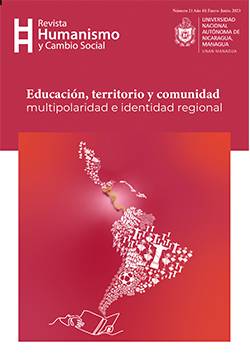B-learning instructional design as a method of learning for the Automation of Information Units II course
DOI:
https://doi.org/10.5377/hcs.v21i21.16763Keywords:
Virtual environments, teaching and learning, didactic design, b-learning, methodologies, ADDIE modelAbstract
This study was conducted within the setting of the Information Management major at the Faculty of Humanities and Legal Sciences at UNAN-Managua, specifically focusing on the Automation of Information Units II course. The aim of this research is to develop a blended learning instructional design to enhance student learning in the subject. It is proposed as a solution to address the learning challenges faced by students during the second semester of 2021, resulting from the lack of computer labs. The study follows a qualitative approach, as it involves analyzing the perspectives of key informants through instruments such as interviews, focus groups, and observations. The research is nonexperimental and descriptive in nature, as it aims to delineate the traits and profiles of the individuals who are subject to analysis. The analysis of the results indicates that the implementation of the b-learning didactic design for the subject is viable, given the Faculty’s technological infrastructure capabilities. However, due to limited laboratory access during Saturday meetings, students have been unable to fully grasp the use and management of database systems. Similarly, the practice servers are locally configured and accessible only through the UNAN-Managua network. Additionally, while there is a Moodle platform available at the Faculty, the teachers for the subject in question do not utilize it.
Downloads
240
References
Cruz-Pérez, M., Pozo-Vinueza, M., Juca-Aulestia, J., y Sánchez-Ramírez, L. (2020). La Integración de las TIC en el currículo de Educación Superior en la última década (período 2009-2019). Revista Ciencias Pedagógicas e Innovación, 8(1), pp.55-61.
https://incyt.upse.edu.ec/pedagogia/revistas/index.php/rcpi/article/view/368/415
García Aretio, L. (2012). Blended, ¿mezcla o integración? (12,7). Contextos Universitarios Mediados (ISSN: 2340-552X). https://aretio.hypotheses.org/135.
García Aretio, L. (2018). Blended learning y la convergencia entre la educación presencial y a distancia. RIED. Revista Iberoamericana de Educación a Distancia, 21(1), pp.9.
https://doi.org/10.5944/ried.21.1.19683
Garzón Calderón, L. (2018). Uso y apropiación de herramientas TIC de estudiantes y docentes investigadores en universidades en Medellín - Dialnet. Revista Virtual de La Institución Universitaria de Envigado, 12(20), pp.49-73. https://dialnet.unirioja.es/servlet/articulo?codigo=6573536
González Aldana, M., Perdomo Osorio, K., y Pascuas Rengifo, Y. (2017). Aplicación de las TIC en modelos educativos blended learning: Una revisión sistemática de literatura. Sophia, 13(1), pp.144-154. https://doi.org/10.18634/SOPHIAJ.13V.1I.364
Hernández Sampieri, R., Fernández Collado, C., y Baptista Lucio, P. (2014). Metodología de la Investigación (6ta. Edición). http://observatorio.epacartagena.gov.co/wp-content/uploads/2017/08/metodologia-de-la-investigacion-sexta-edicion.compressed.pdf
Juca Maldonado, F., Carrión González, J., y Juca Abril, A. (2020). B-learning y Moodle como estrategia en la educación universitaria. Conrado, 16(76), pp. 215-220. http://scielo.sld.cu/scielo.php?pid=s1990-86442020000500215&script=sci_arttext&tlng=en
Martí Arias, J. (2011). Aprendizaje mezclado (B-Learning) Modalidad de formación de profesionales. Revista Universidad EAFIT, 45(154), pp.70-77. https://publicaciones.eafi t.edu.co/index.php/revista-universidad-eafi t/article/view/68
Otero Escobar, A. (2018). Plataformas Virtuales de Aprendizaje en la Educación Superior. Intercambiando Saberes, 2(4), pp.83-98. https://is.uv.mx/index.php/IS/article/view/2545
Peinazo Morales, M. (2020). Estudio de validación didáctica de Laboratorios Virtuales integrados en plataformas b-learning y/o en redes sociales ubicuas, y su combinación con gamifi cación en enseñanzas de Educación Superior [Universidad de Cordoba]. https://helvia.uco.es/handle/10396/20782
Sánchez Rodríguez, J. (2005). Plataformas tecnológicas para el entorno educativo. Acción Pedagógica, 14(1), 18–24. https://dialnet.unirioja.es/servlet/articulo?codigo=2968980
Torres Velandia, S. Á., Barona Ríos, C., y García Ponce de León, O. (2010). Infraestructura tecnológica y apropiación de las TIC en la Universidad Autónoma del Estado de Morelos: Estudio de caso. Perfi les Educativos, 32(127), 105–127. http://www.scielo.org.mx/scielo.php?pid=S0185-26982010000100006&script=sci_arttext
Torrez Soza, E. A. (2018). Virtualización de la asignatura Administración de Empresas I, para la formación de los estudiantes de la carrera Gerencia y Administración de Empresas de la American University durante el II semestre 2017.
Universidad Nacional Autonoma de Nicaragua, UNAN-Managua (2012). Gestión de la información. pp (04)
Downloads
Published
How to Cite
Issue
Section
License
Copyright (c) 2023 Universidad Nacional Autónoma de Nicaragua, UNAN-Managua

This work is licensed under a Creative Commons Attribution-NonCommercial-ShareAlike 4.0 International License.




